Can Dogs Eat Grapes?
Sure, you adore your furry friend, and they love their treats. But amidst playtimes and belly rubs, remember to steer clear of grapes. These juicy tidbits make great snacks for you, but for your pet, they’re bad news.
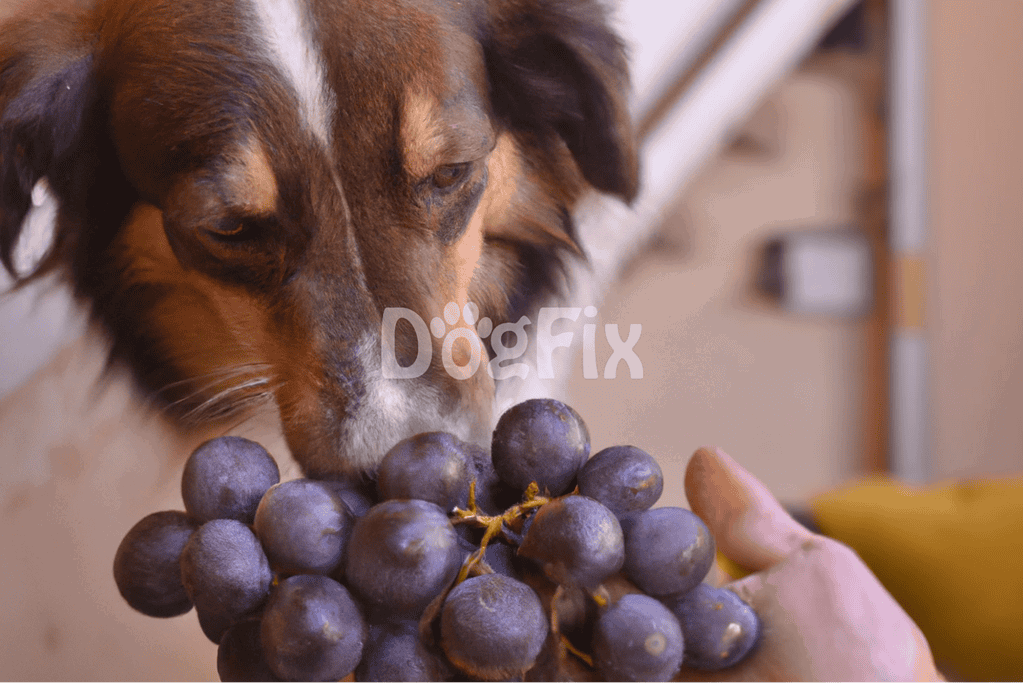
You may wonder, “Why are grapes dangerous for dogs?” Frankly, we’re not entirely sure. Even small amounts can cause severe reactions in some dogs, but others have eaten grapes with no ill effects.
However, why risk it? Until science unravels this grape enigma, it’s wise to keep them away from our pets, including cunningly hidden raisins that could also upset their health.
Grapes: A Dog’s Real-Life Horror Story
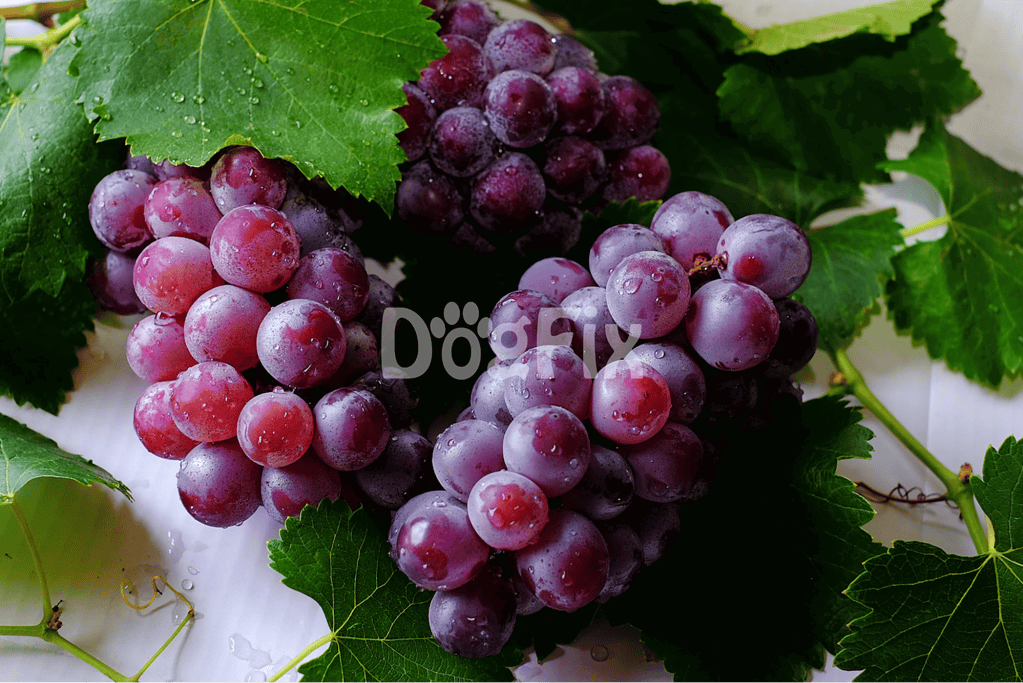
So let’s talk more about grapes and dogs. In the world of furry companions, this is a legit scary tale.
Grapes, Canines & Toxicity
Grapes and their dehydrated counterparts, raisins, spell trouble for our furry companions. It appears dogs struggle to digest certain components in grapes, leading to potential health problems.
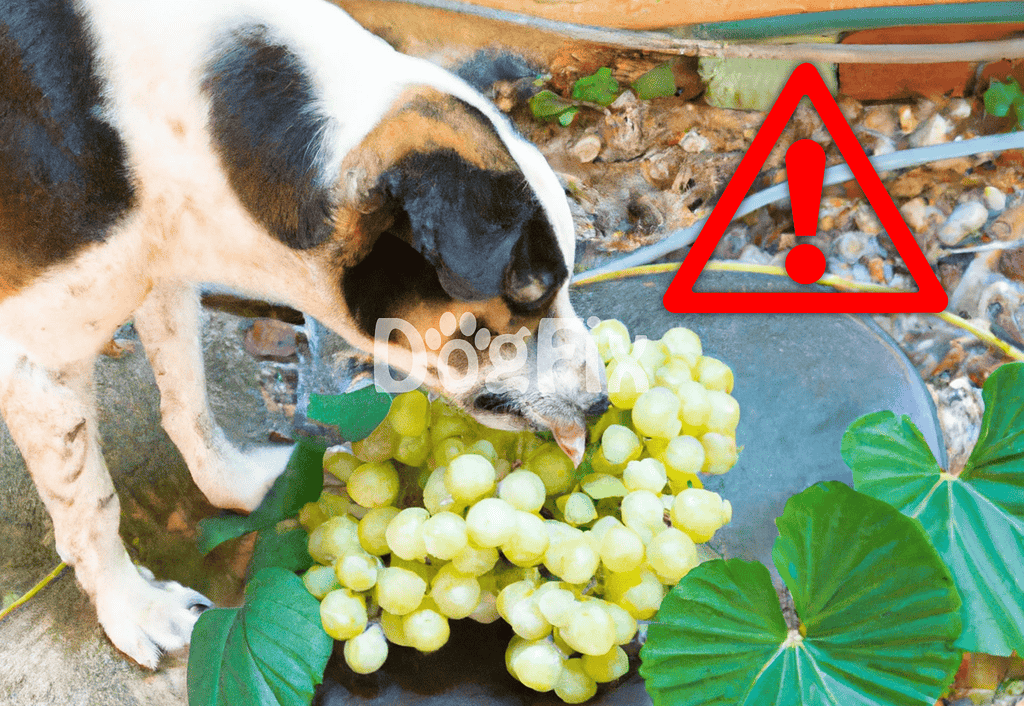
Some dogs might nibble on a grape and be completely fine, while others could land in serious doggie trouble after eating only a few. For some unlucky fellas, even four measly grapes can cause death.
Scientists are working hard to determine why some dogs are more vulnerable to grapes. It could have something to do with the grape ripening process or how each dog processes them.
Why Grapes & Dogs Go Together Like Orange Juice & Toothpaste

Despite their popularity among us humans, it’s essential to remember that these fruity delights can spell trouble for our four-legged buddies in any form.
The Grape, Raisin, and Very Bad Day Scenario
Grapes and their dried-up counterparts, raisins, are big foes to our canine buddies, in any form.

Fresh or dried, with seeds or not, peeled or processed – all are risky. They’re like kryptonite to pups, potentially causing brutal health issues like sudden kidney failure.
Currants & Sultanas: The Sneaky Villains!
Currants and sultanas are also part of the grape family, adding an exotic touch to our dishes, but for dogs, they’re still dangerous! Just like their grape and raisin relatives, these little dried villains do the same harm to dogs’ kidneys and overall health.
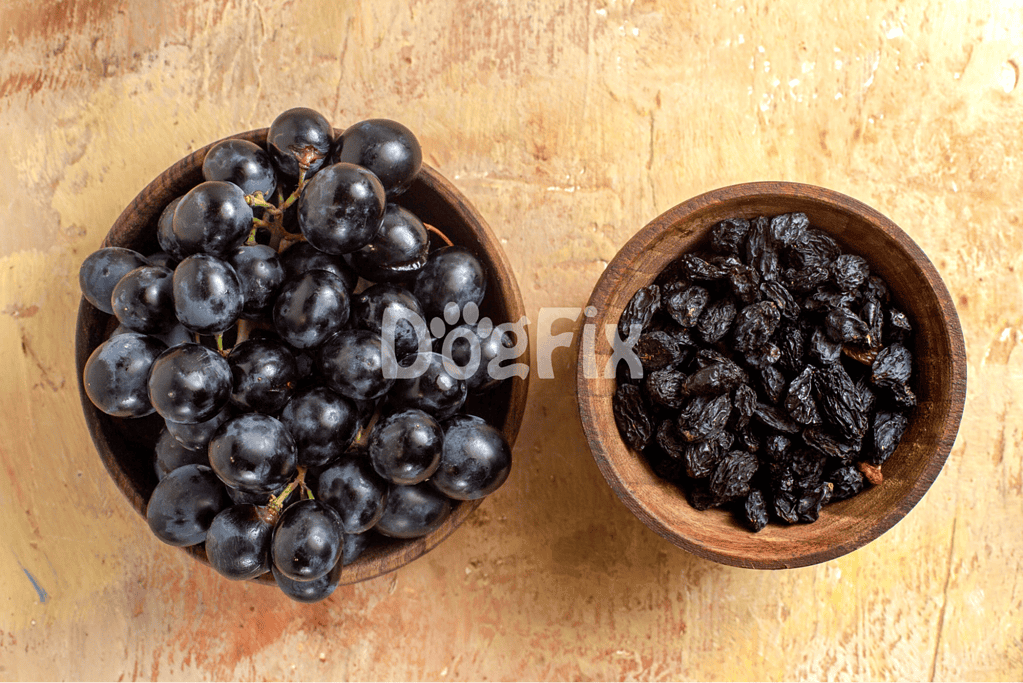
Sure, some dogs might have munched on these toxic fruits and appeared fine, but it’s as sneaky as a top-tier magician. It might be fine now, but the nasty effects could rear their ugly heads down the line and leave dogs in a tight spot.
Some Fruits are Pals, Though!
Now, don’t swear off all fruits for your bud just yet. Apples and bananas, for instance, are dog-friendly (just watch out for those apple seeds!). They’re a great source of vitamins and add a little something-something to their diet.

In a nutshell, when it comes to dogs, grapes, raisins, currants, and sultanas should be avoided. They’re unsafe, and the best action is to keep those little culprits out of reach.
Enjoying this read?
We publish this content for free to generate interest in our Premium members' area. By subscribing, you can ask the writer any questions related to pet care and this article, get access to 100+ Premium Pet Care Guides and go Ad-Free with DogFix Premium for $2.99.
Grape Poisoning Symptoms: Things to Watch Out for
Did your fur baby think they’ve hit the jackpot by finding some grapes or raisins lying around? It’s essential to be clued up on the signs of grape poisoning, so let’s dive right in!
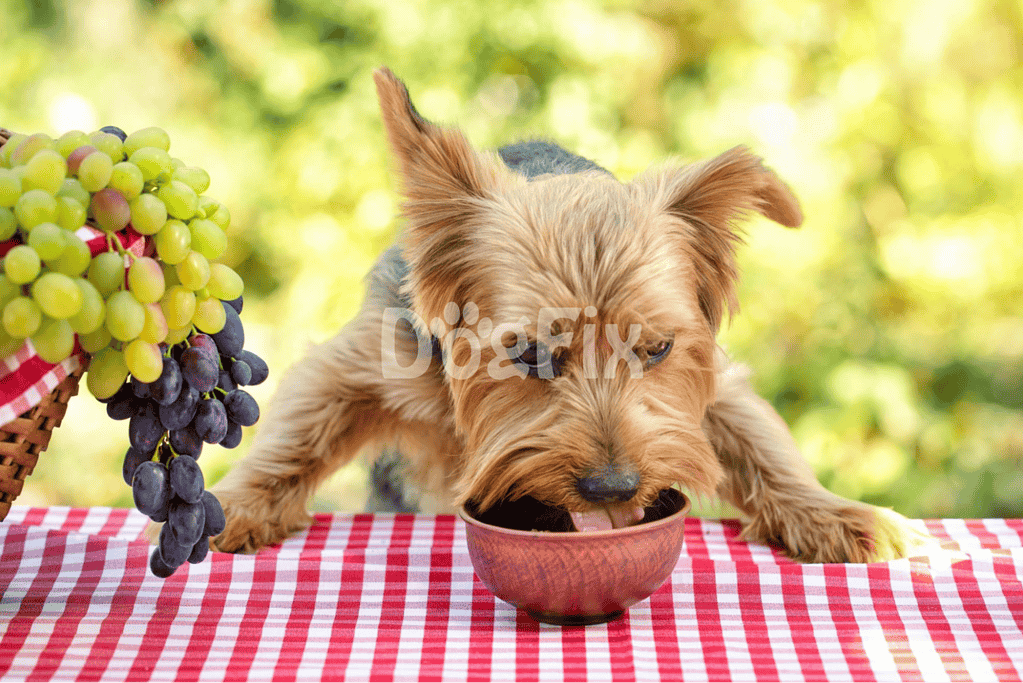
First, it’s a bit like how you feel when you’ve overindulged at the buffet – stomach upset. Vomiting and diarrhea might kick in from 6 to 12 hours after they’ve munched on the forbidden fruit.

Are they not feeling up to play around? That could be a sign of trouble. Other red flags are feeling weak, or thirsty, like they’ve just had a marathon run in a doggie desert.
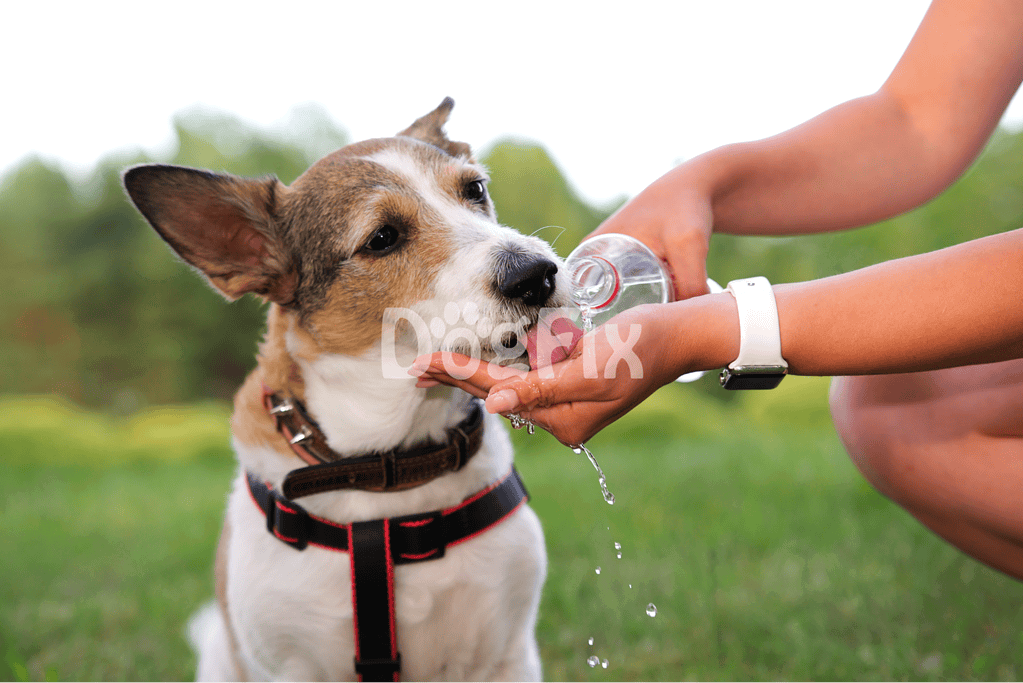
Is Fido acting like touch causes an ouch? This could mean tummy pain, which isn’t great. Dry nose, pale gums, and panting can also mean dehydration, along with thirst.
Some severe worry signs are trouble breathing, shaking, or acting really ‘off.’ If you spot these, it’s time to jump into speedy action.
Code Red: What You Gotta Do
So you’ve caught Fido noshing on grapes or raisins?
First, call your vet or an animal poison control center for professional backup.
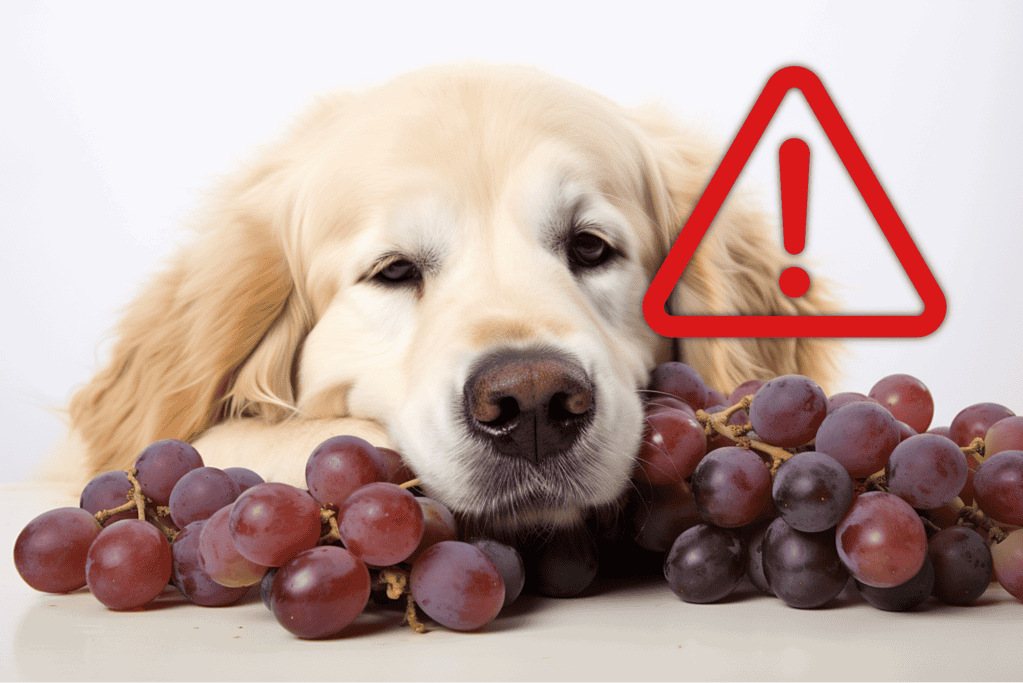
Sometimes, they might suggest you help your dog throw up. But don’t just wing it, make sure you follow their instructions carefully.
Once you’ve got the professionals involved, it’s eyes on the prize. Be on watch for symptoms, like vomiting, thirst, or sudden changes in temperament.
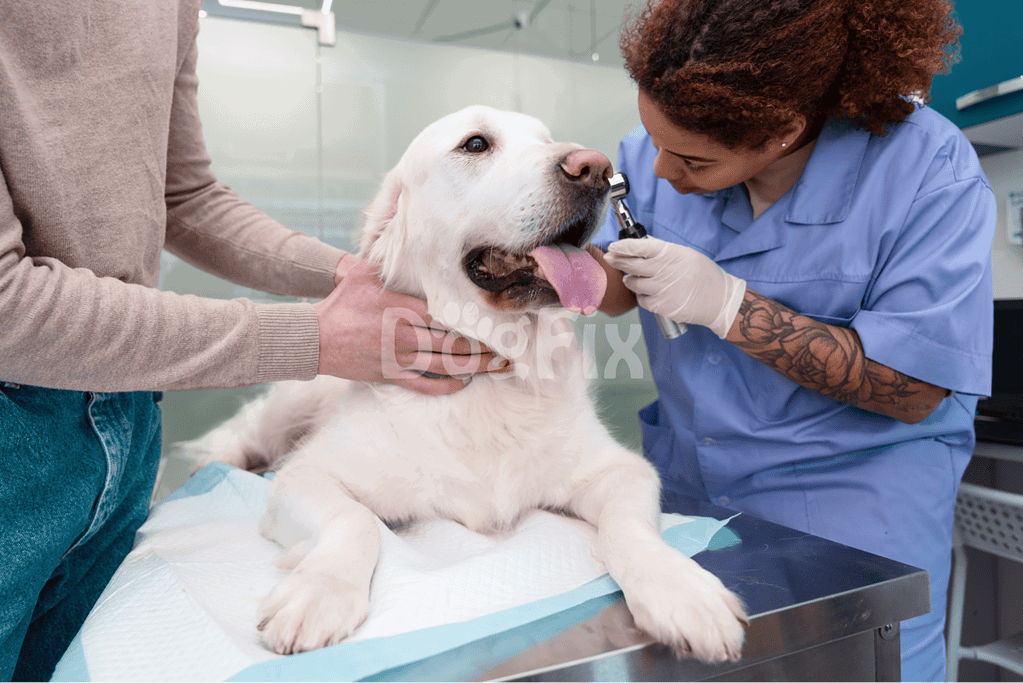
If things get hairy, you might need to whisk them off to the animal ER for further treatment. They might then get some meds to counteract the toxic grape nasties and help out their kidneys.
In summary? If your dog gobbles up some grapes, stay calm. Contact a vet, keep a watchful eye on your pup, and remember – your quick response can significantly aid their recovery, helping them return to health!
The Not-So-Fun Long-Term Health Complications
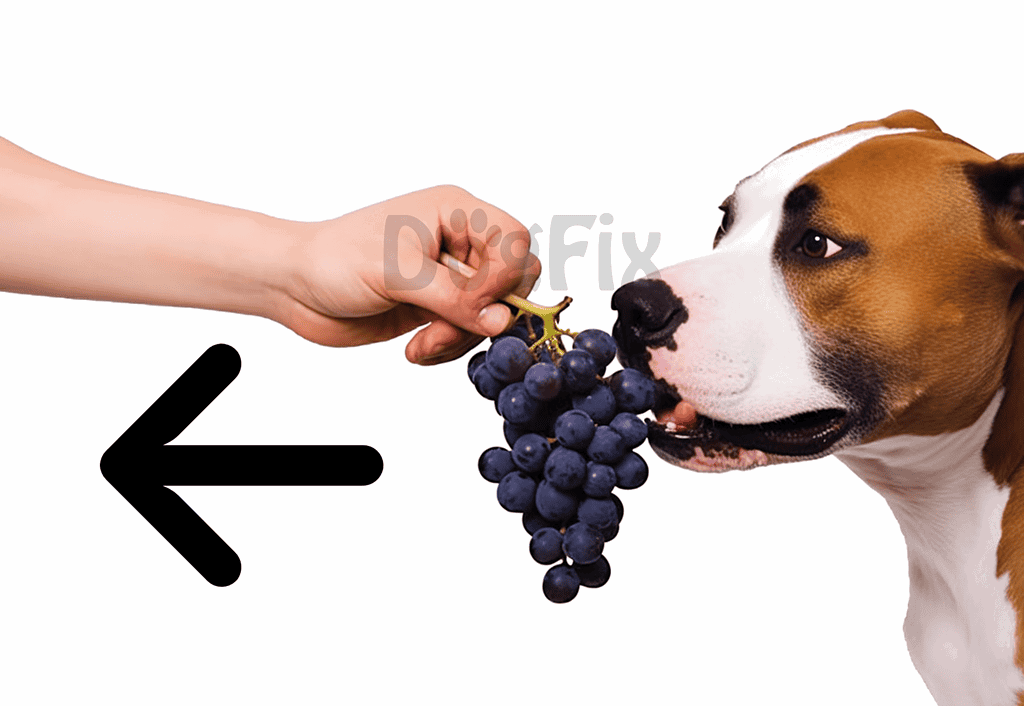
It might seem like a bit of harmless curiosity when your dog goes after a grape or a raisin, but things can take a severe turn. Consuming these sweet little rolling hazards can lead to something way less sweet – kidney failure.
Kidney Failure
Kidney troubles in dogs, like acute, sudden or renal failure, are as scary as they sound and can shorten your pooch’s lifespan.
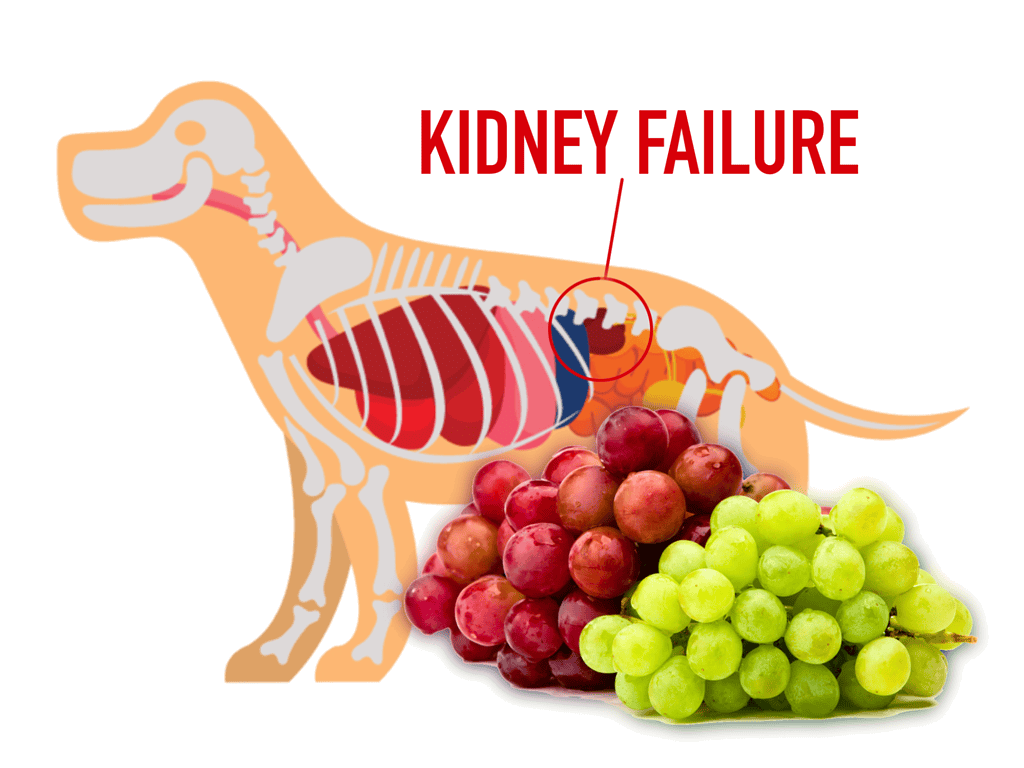
Even a teeny munch on these ‘no-no’ fruits can lead to various effects, from mild discomfort to a major blow to their health.
If kidney trouble is brewing, you might find your dog trying to beat the world record for the longest pee or needing a refill to their water bowl every five seconds.
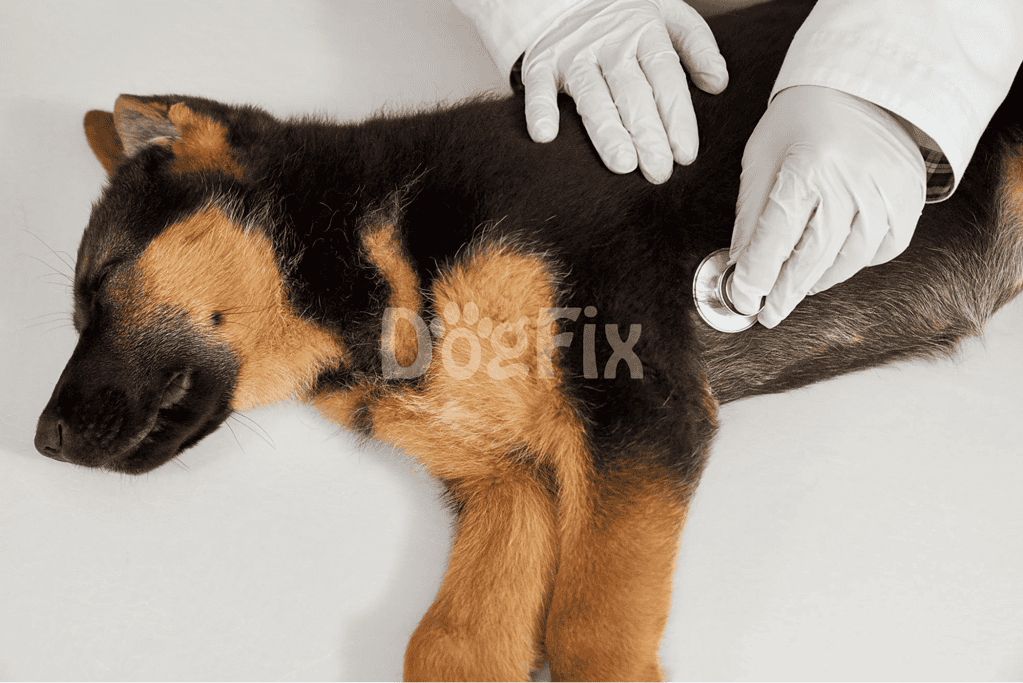
If we don’t catch these symptoms and treat them, it could be death for our bud.
If your dog sneaks a grape snack, don’t wait for the symptoms to kick in before being proactive. Run, don’t walk, to your vet!
Grapes and Related Foods: Safe or Not?
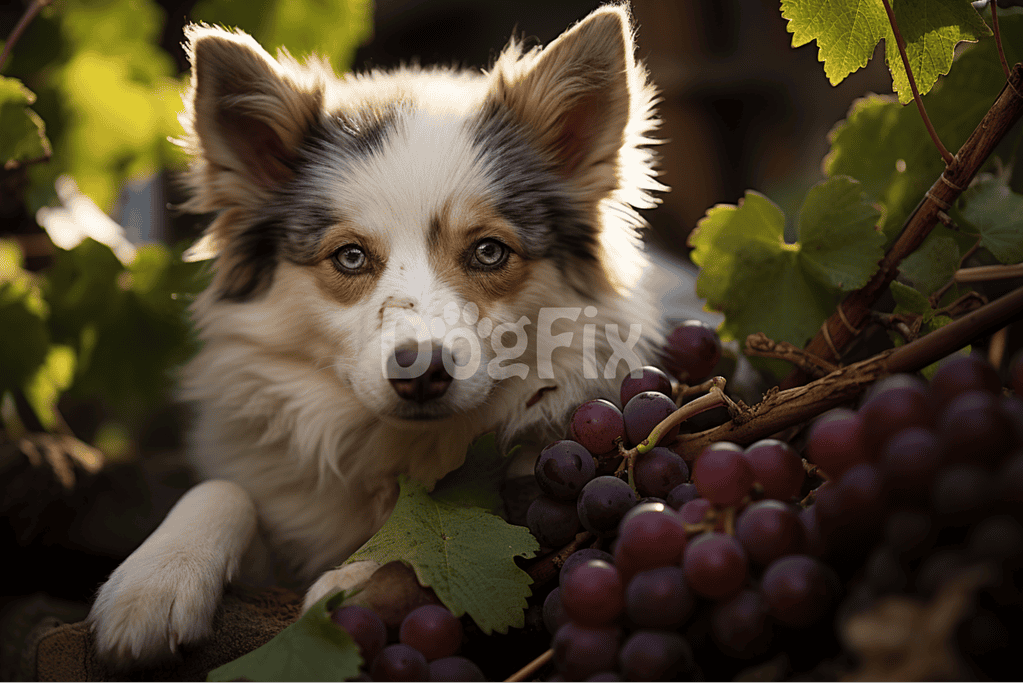
Grapes, raisins, and related fruits are problematic for dogs, potentially causing kidney damage and serious health issues. Whether in jelly, peeled, or plain form, ingesting these is a warning sign for kidney troubles and other health concerns in dogs.
But Not All Fruits Are Enemies
Now, don’t throw all fruits and veggies into the doggie danger zone. Some are actually good for our pals! Take peas, for instance. Behind their dainty green exterior are a powerhouse of vitamins and minerals.
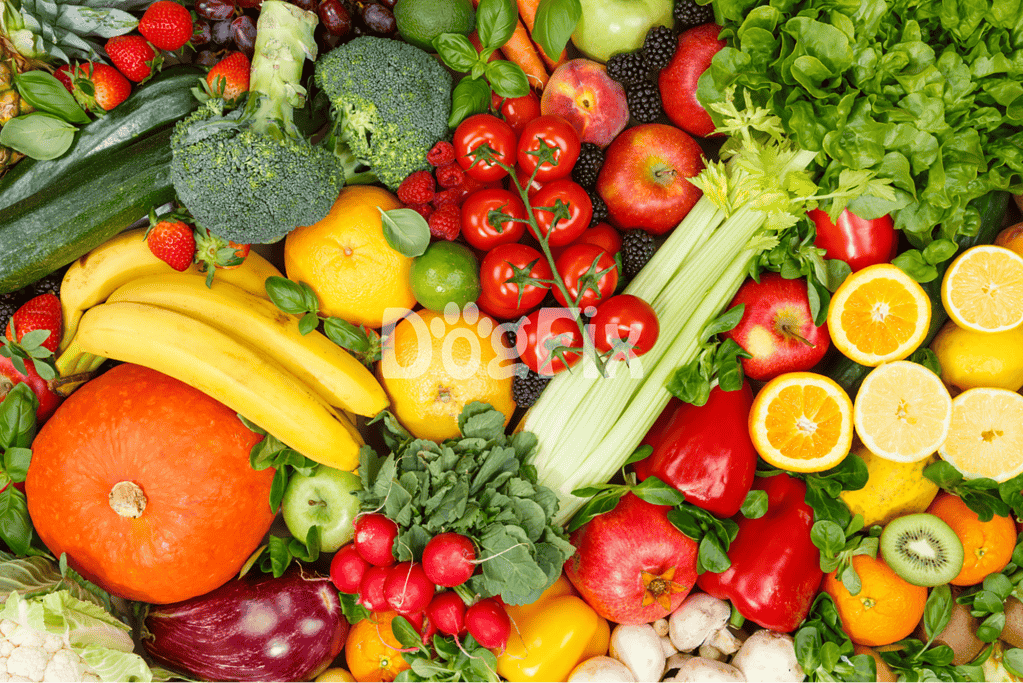
Switch your focus to the garden, and asparagus and green beans also raise their hands as top-class, pooch-friendly treats.
And what about fruits? They’re not all disguised villains! Blueberries and melons are the superheroes of the fruit world for dogs. They’re like the canine equivalent of hitting the jackpot, stuffed with vitamins, antioxidants, and fibers.
Beware Of The Cake
Though pampering our pups is tempting, treats like fruit cakes with raisins are off-limits.

Simply put, despite your dog’s desire for grapes or raisins, resist giving in. Substitute with healthy options like peas, asparagus, blueberries, melon, or green beans. Providing a balanced diet of dog-safe foods is the key to a healthy, happy fur friend!
Preventing Grape Consumption
Let’s face it, dogs are like furry toddlers who can unlock your smartphone. They get into everything they’re not supposed to and there’s no limit to their curiosity.
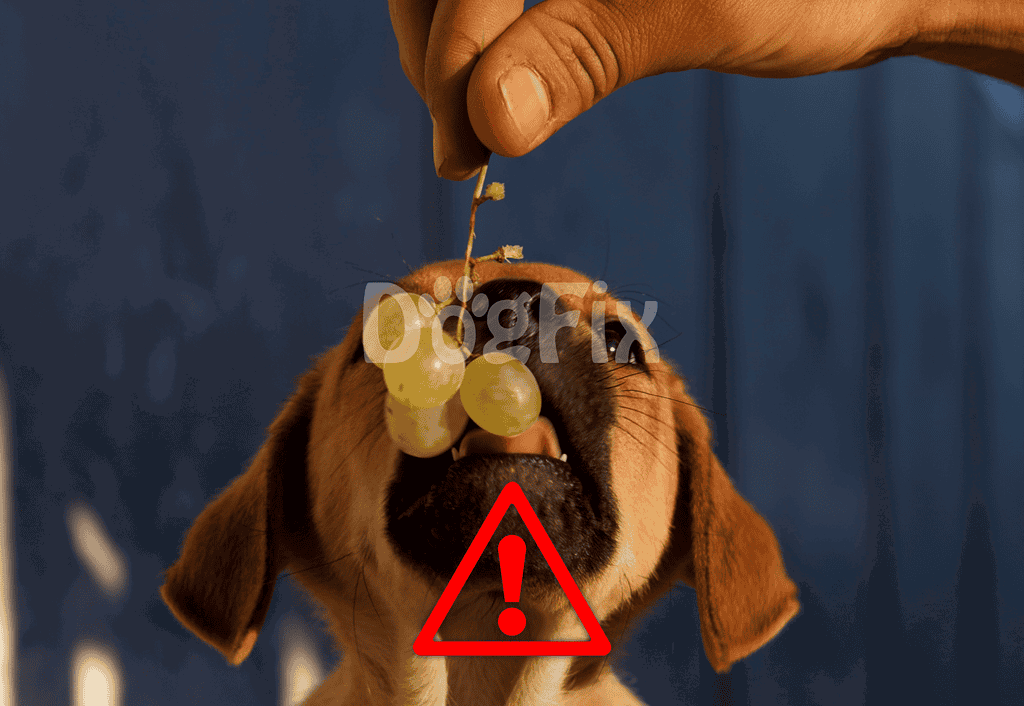
But when it comes to grapes, it’s time to firm up our best Dad voice and set some boundaries, because every dog breed, from the tiniest Chihuahua to the biggest Great Dane, from pup to golden oldie, and every in-betweener, should be kept far from grapes.
Spread the News
Inform kids, family, friends, and all visitors about your no-grape rule for dogs. Keep grapes and their dried-up cousins, raisins, securely stowed in a ‘canine-inaccessible’ area. Let everyone understand why these snacks are a no-go for your furry companion.
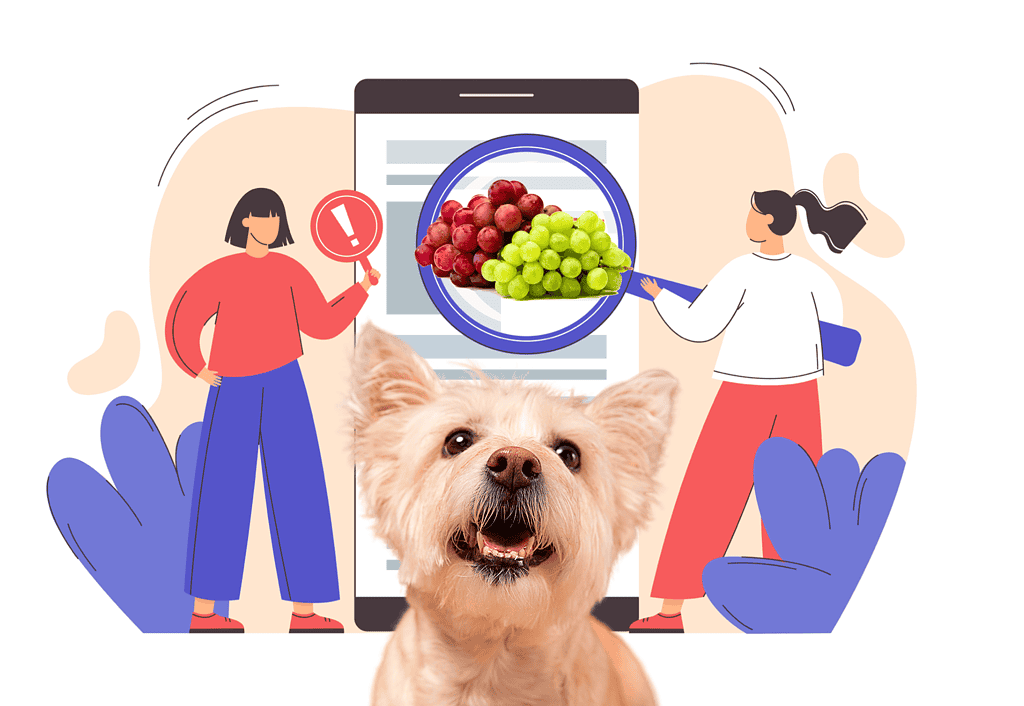
And don’t forget about your other furry family members. Keep feline friends who might feel like playing a part in a grape disaster in check.
Watch Out For Your Grocery Bags
Be sure to investigate the ingredients list on pet food or treats thoroughly. Our dogs can sniff out a dropped grape like a pro – so watch out for grocery bags with any trace of these little green gremlins.
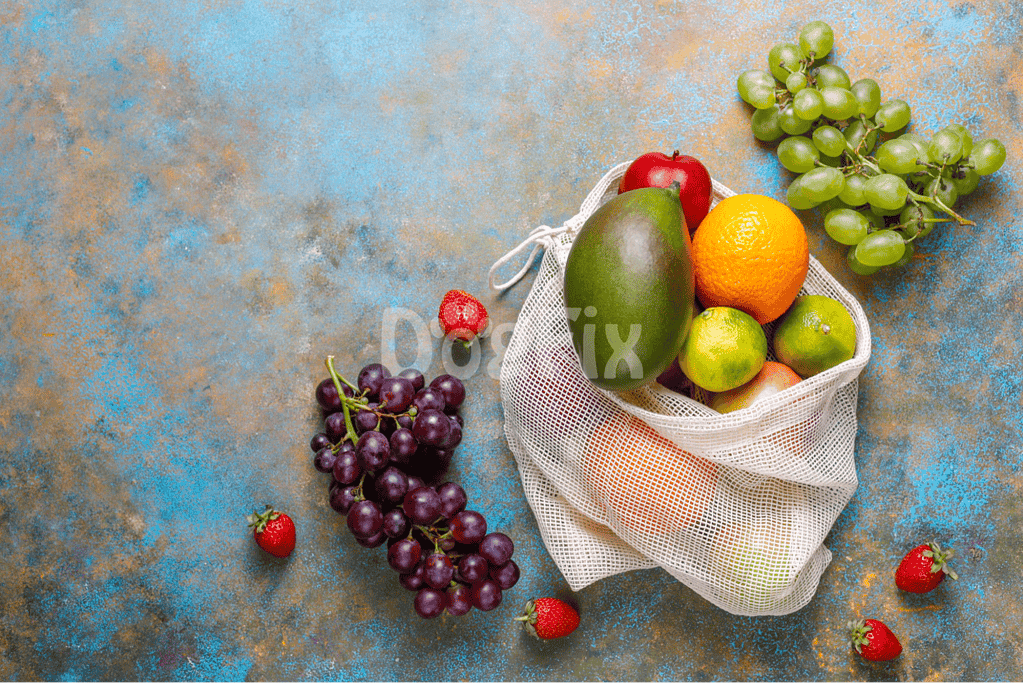
In essence, keep an eagle eye out to save your furry friend from the strong punch packed by grapes. Education and attentiveness will help you sidestep any grape-related pitfalls that could harm your dog.
FAQs Answered
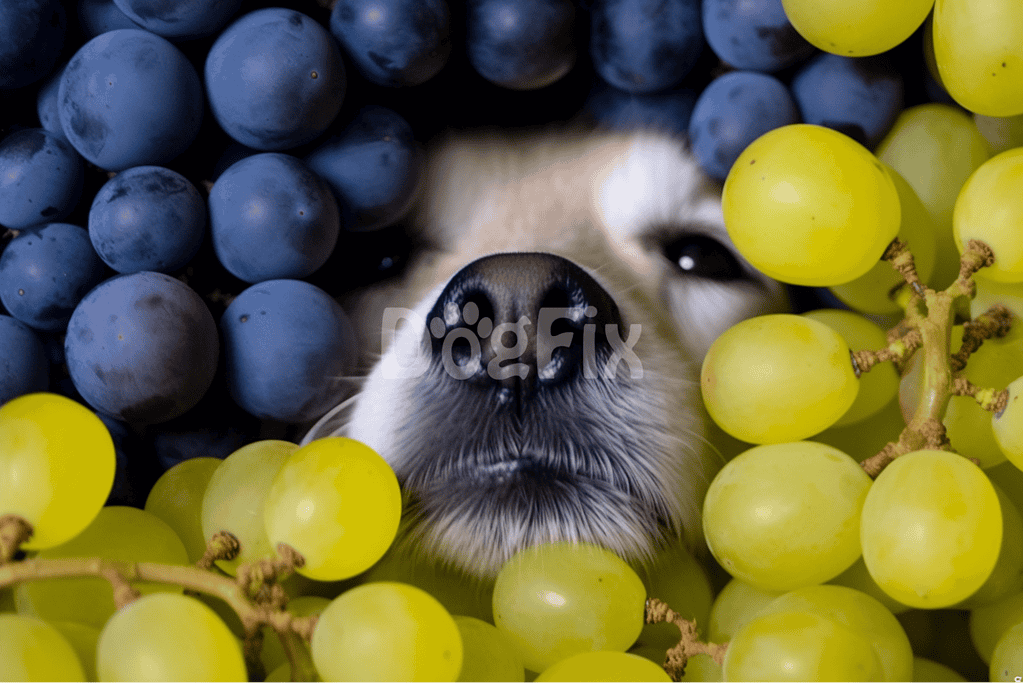
Let’s cut to the chase and tackle those burning grape-dog questions head-on.
Are green grapes toxic to dogs?
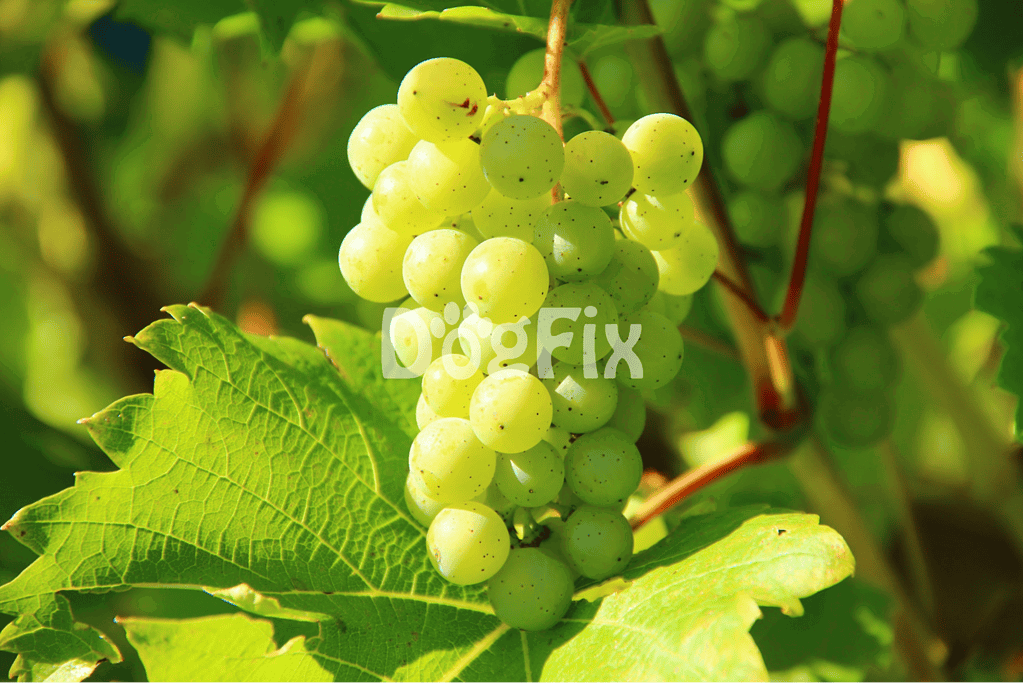
Absolutely yes! All grapes, no matter the color of their tiny grape coats – green, red, black – are a solid no-go for pooches.
What is the risk of dogs eating grape seeds?
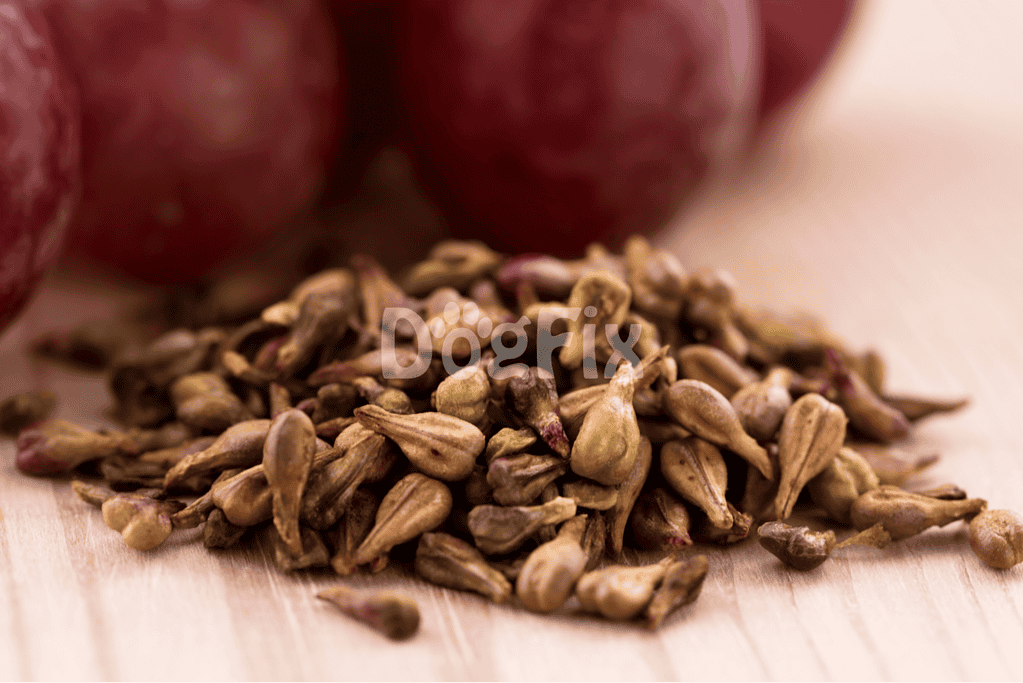
Whether your grapes have had their seeds removed, they’re still a villain in the doggie universe. Any grape encounter can cause kidney problems and health issues for your dogs.
How many grapes are dangerous for dogs?
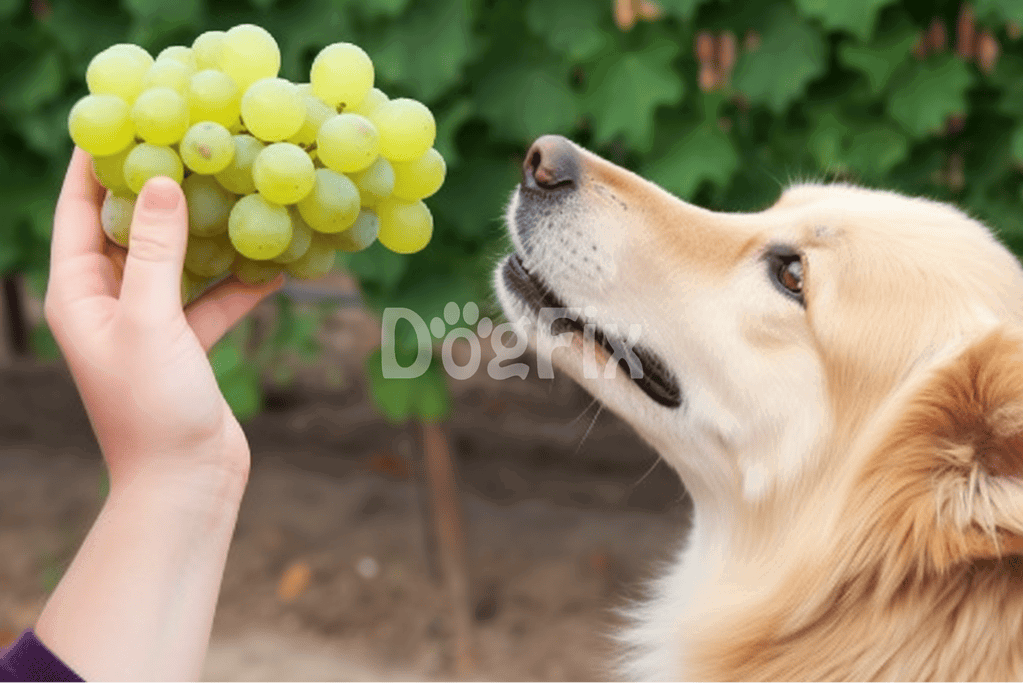
Here’s the wild part – each dog reacts differently to grapes. A few could make one dog unwell, while another might seem fine after the same amount. But keep in mind, even a smidgen can hurt. So, let’s keep our furry pals grape-free, alright?
What are the symptoms of grape toxicity in dogs?
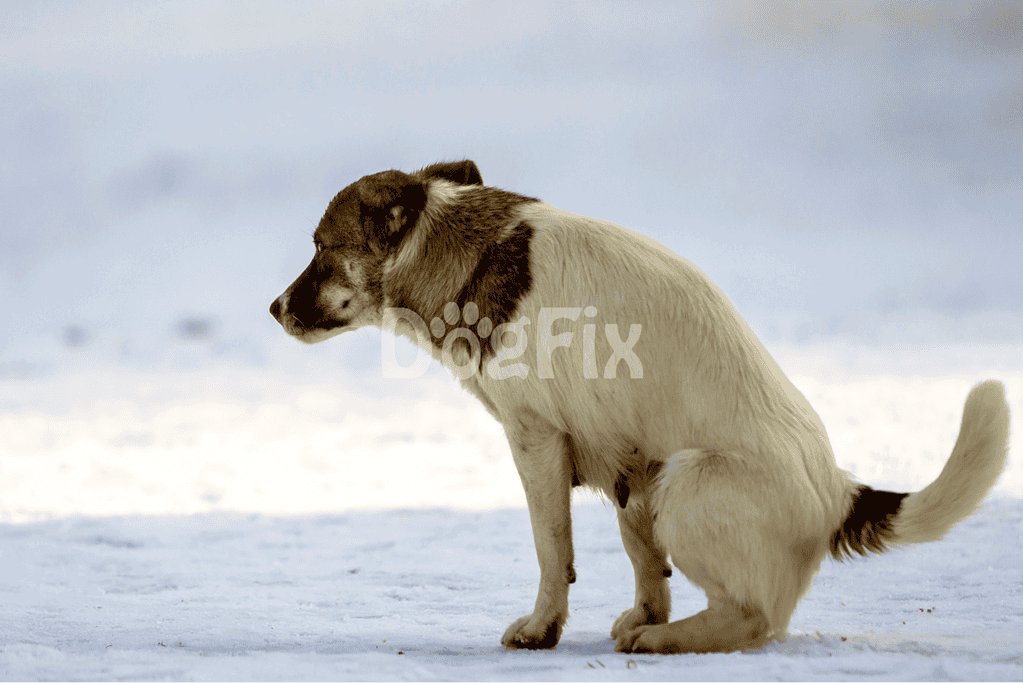
Your dog might throw up, have diarrhea, look like they’ve lost their peppy step, don’t feel too hungry, and be thirsty. Serious business involves sudden kidney failure, and scary signs like not peeing, shivering, or convulsions, which could all lead to a terrible loss.
What should I do if my dog ate grapes?

Dial your vet or emergency animal clinic immediately. The quicker you get vet help, the better the chances are of dodging the worst. Your vet might help induce vomiting, give activated charcoal, or keep your pet under close care.
A Wrap-up in Bite-sized Bites
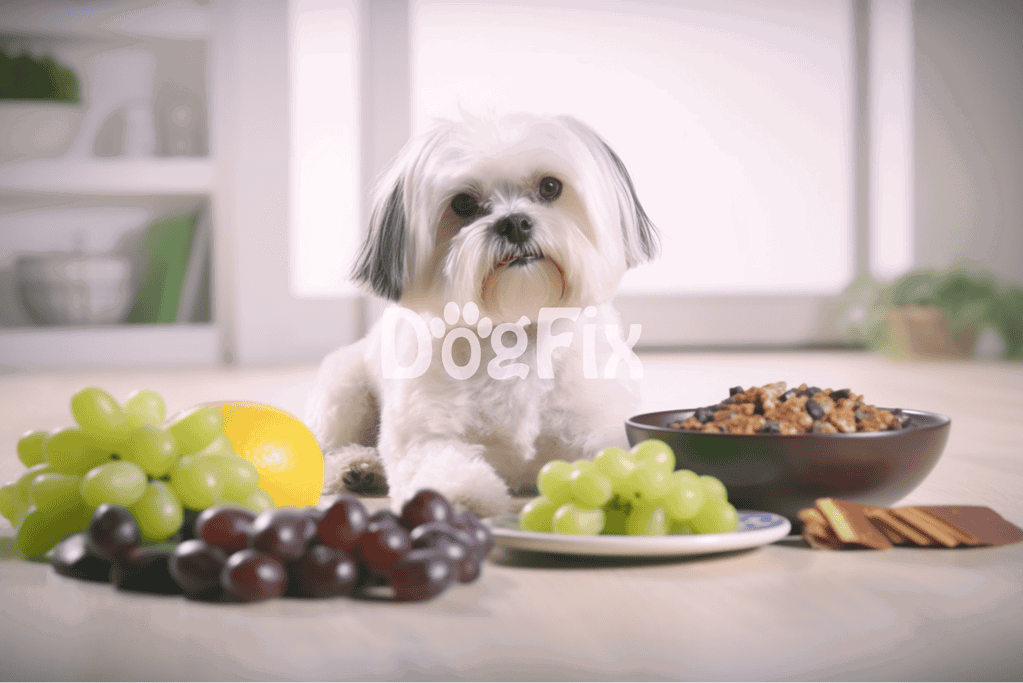
- Grapes, no matter their size or disguise, can drain the life out of your dog.
- Don’t let their size fool you, even tiny amounts or sneaky versions of grapes like raisins or grape jelly can trigger serious health issues.
- Knowing the symptoms of grape poisoning and acting quickly in case of ingestion is crucial for your dog’s well-being.
